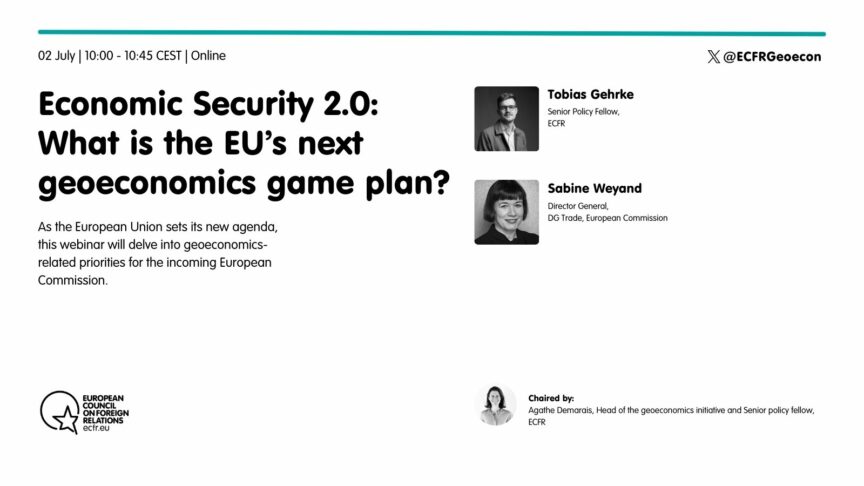
Economic Security 2.0: What is the EU’s next geoeconomics game plan?
As the European Union sets its new agenda, this webinar will delve into geoeconomics-related priorities for the incoming European Commission. Drawing on two new ECFR…

Senior Policy Fellow
Geoeconomics; De-risking; Sanctions; Global economy; Russian economy
French, English, Russian, Arabic (Levantine dialect/classical), Spanish
Agathe Demarais is a senior policy fellow for geoeconomics at the European Council on Foreign Relations. Her areas of interest include the global economy, geopolitics, and sanctions. She leads ECFR’s Re:Order project in the field of geoeconomics, which explores emerging visions of the global order, as well as the interplay between economic might and geopolitical influence. She is based in London, with frequent trips to Paris.
Before joining ECFR, Demarais was the global forecasting director of the Economist Intelligence Unit (EIU), the research arm of The Economist. She led the EIU’s global economic and geopolitical analysis, with a particular focus on trade developments, emerging markets, and economic statecraft.
Demarais is the author of “Backfire”, a book on the global ripple effects of sanctions and export controls. The book draws on her experience as an economic policy advisor for the diplomatic corps of the French Treasury in Russia and Lebanon. She also previously worked in investment banking in Russia and the United States.
She is a regular columnist for Foreign Policy and a frequent commentator for the media. Her essays have appeared in The Economist, The Times, Foreign Affairs, Politico, Le Grand Continent, the Journal of Democracy, and World Politics Review.
Demarais holds master’s degrees from Sciences Po Paris and Columbia University, where she was a Fulbright scholar. She is a younger generation leader of the European Leadership Network, a participant in the Franco-British Young Leaders programme, and a member of the World Economic Forum’s Expert Network.

As the European Union sets its new agenda, this webinar will delve into geoeconomics-related priorities for the incoming European Commission. Drawing on two new ECFR…
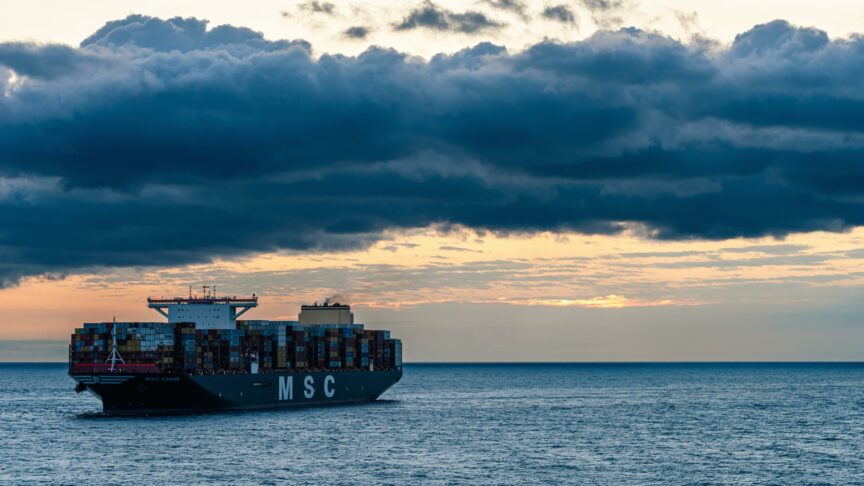
European countries are increasingly using economic statecraft, such as sanctions, export controls or industrial policy, to respond to geopolitical challenges. To co-ordinate a comprehensive response, the next European Commission needs a geoeconomics vice president
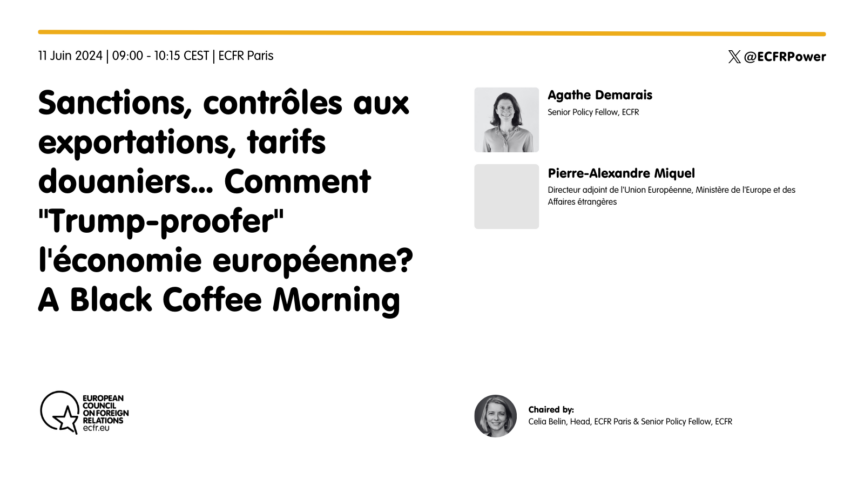
À seulement six mois de l’élection présidentielle américaine de novembre, les Européens s’efforcent de se préparer à une possible réélection de Donald Trump. Dans le domaine…
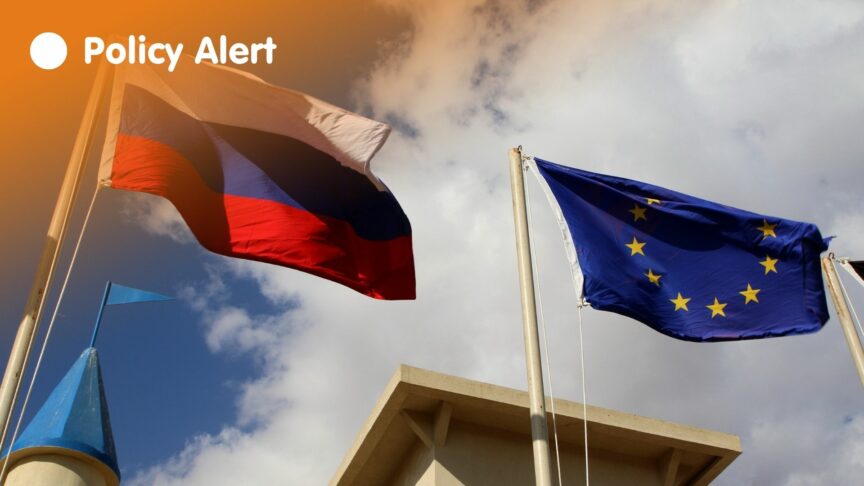
Disagreement over expanding the EU’s energy-related restrictions makes a ban on Russian LNG imports unlikely. At the same time, potential measures on helium suggest Europeans are keen to avoid becoming dependent on the growing Russian industry
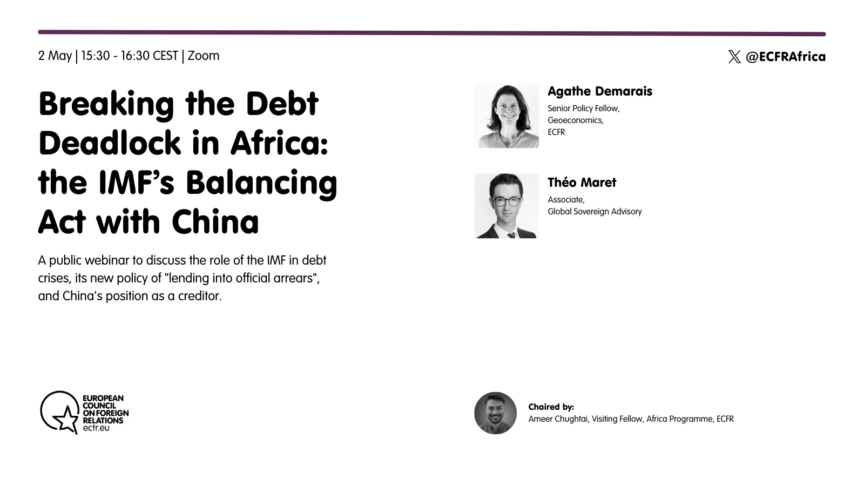
The economic shock after COVID-19 plunged many African economies into debt trouble. Yet, four years later, the current system for restructuring debts – the G20 Common…
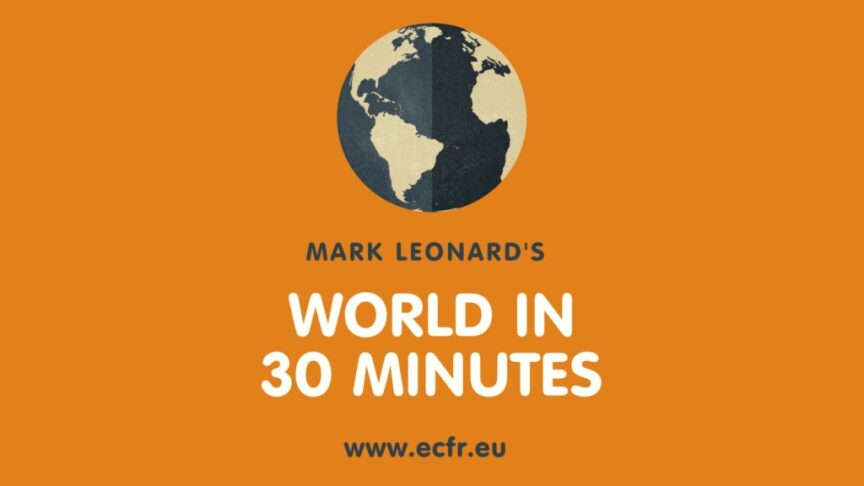
Mark Leonard welcomes Cinzia Bianco, Agathe Demarais, and Camille Lons to discuss the geoeconomics of the Gulf
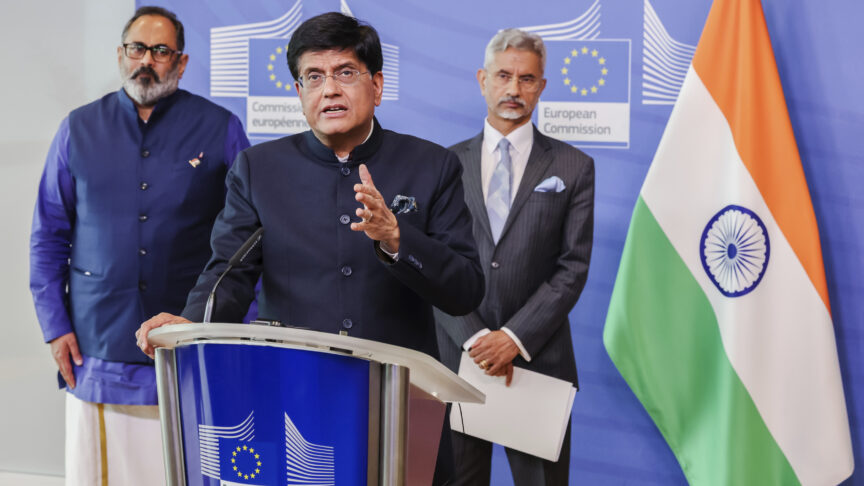
India’s tough stance at the World Trade Organisation’s ministerial conference in Abu Dhabi illustrates emerging economies’ rising resentment towards EU trade policies

Mark Leonard welcomes Agathe Demarais and Stephen Adams to discuss de-risking and its impact on Europe and the global economy
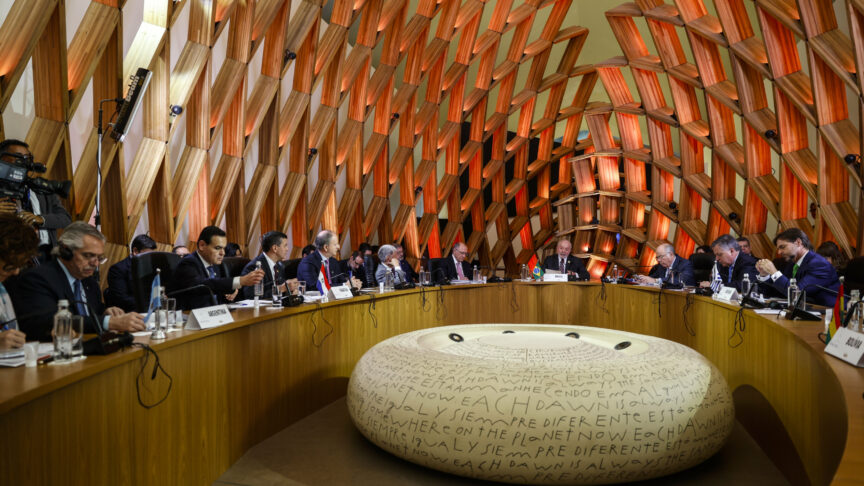
Deepening ties with Mercosur countries makes perfect sense as part of the EU’s de-risking efforts to diversify economic ties away from China. Further delays in signing a free trade deal would push Latin America closer to China’s orbit – for good
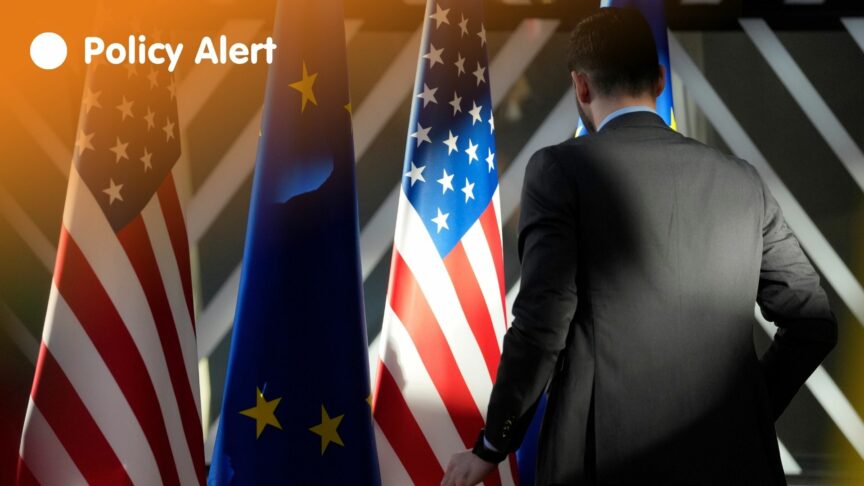
The upcoming US-EU summit highlights a sharp improvement in transatlantic relations. It could bring meaningful progress for the EU in three economic areas

European countries are increasingly using economic statecraft, such as sanctions, export controls or industrial policy, to respond to geopolitical challenges. To co-ordinate a comprehensive response, the next European Commission needs a geoeconomics vice president

Disagreement over expanding the EU’s energy-related restrictions makes a ban on Russian LNG imports unlikely. At the same time, potential measures on helium suggest Europeans are keen to avoid becoming dependent on the growing Russian industry

India’s tough stance at the World Trade Organisation’s ministerial conference in Abu Dhabi illustrates emerging economies’ rising resentment towards EU trade policies

Deepening ties with Mercosur countries makes perfect sense as part of the EU’s de-risking efforts to diversify economic ties away from China. Further delays in signing a free trade deal would push Latin America closer to China’s orbit – for good

The upcoming US-EU summit highlights a sharp improvement in transatlantic relations. It could bring meaningful progress for the EU in three economic areas
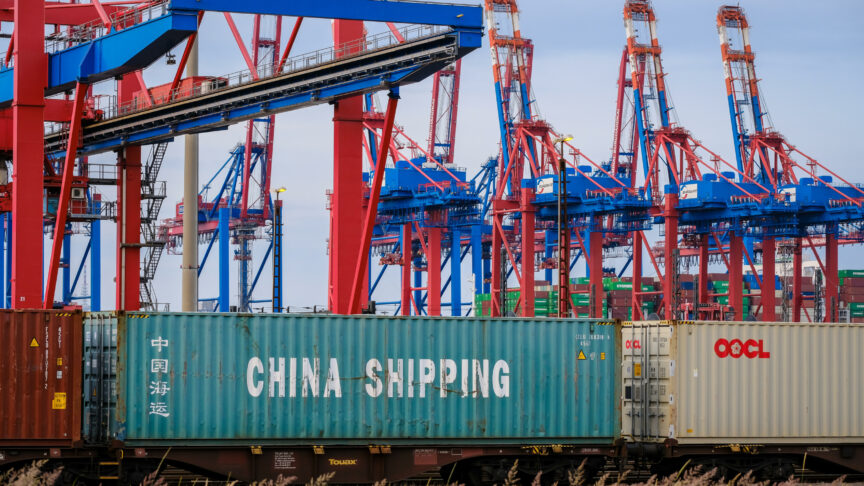
The recently unveiled EU list of critical technologies highlights the difficulties of de-risking for the bloc. To avoid seeing the process stall, the EU must get the private sector on board, admit that European tech supply chains are still distant, and acknowledge that de-risking is all about China

Mark Leonard welcomes Cinzia Bianco, Agathe Demarais, and Camille Lons to discuss the geoeconomics of the Gulf

Mark Leonard welcomes Agathe Demarais and Stephen Adams to discuss de-risking and its impact on Europe and the global economy
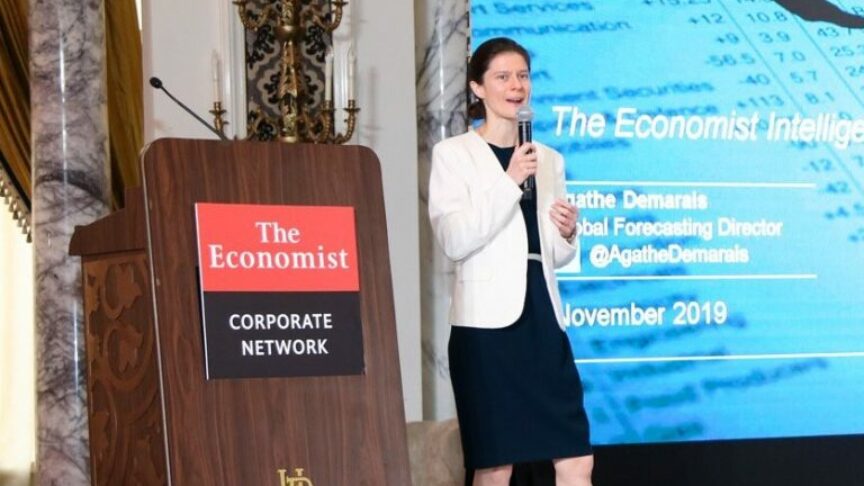
Mark Leonard talks with Agathe Demarais about how sanctions work and how they can be truly effective

As the European Union sets its new agenda, this webinar will delve into geoeconomics-related priorities for the incoming European Commission. Drawing on two new ECFR…

À seulement six mois de l’élection présidentielle américaine de novembre, les Européens s’efforcent de se préparer à une possible réélection de Donald Trump. Dans le domaine…

The economic shock after COVID-19 plunged many African economies into debt trouble. Yet, four years later, the current system for restructuring debts – the G20 Common…